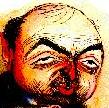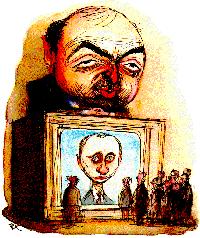
Russian oligarch
Boris Berezovsky
 Russian oligarch Boris Berezovsky |
The Low Morality of Vladimir Putin

|
"The Real Vladimir Putin," by Paul J. Saunders, from The Washington Times, January 6, 2000, p. A15.
|
Welcome to the safest club in town Originally at www.guardian.co.uk/yeltsin/Story/0,2763,194985,00.html |
Under the direction of Mr. Putin, Russia is well into its transition into an authoritarian state. [...] |
Putin's decision on Monday to end the system of direct popular election of Russia's governors, and to have the Russian parliament elected on the basis of slates chosen by national party leaders he mostly controls, is an unambiguous step toward tyranny in Russia. [...] Putin is imposing dictatorship the old-fashioned way, in the manner of a Ferdinand Marcos, an Anastasio Somoza or a Park Chung Hee. He claims that he needs to strengthen the state to face its enemies. So did they. Russia does need to fight terrorism. But eliminating elections and quashing Putin's political opponents has nothing to do with that fight. [...] A dictatorial Russia is at least as dangerous to U.S. interests as a dictatorial Iraq. [...] A Russian dictatorship can never be a reliable ally of the United States. A Russian dictator will always regard the United States with suspicion, because America's very existence, its power, its global influence, its democratic example will threaten his hold on power. [...] Did the United States help undo Soviet communism only to watch as tyranny takes its place? Is that the legacy President Bush wants to leave behind? Robert Kagan, Stand Up to Putin, Washington Post, 15-Sep-2004 www.washingtonpost.com/wp-dyn/articles/A21853-2004Sep14.html |
More than 50 former Soviet dissidents who spent years in prisons and Siberian exile say Russia is in danger of slipping back into a police state under President Vladimir Putin and the former KGB colleagues he has brought to power. [...] "More than 50 percent of the key state positions are occupied by former KGB officials," Kuznetsov said. "The KGB officials have a specific mentality. They can't change. [...] Bukovsky [...] recalled that Putin has lamented the collapse of the Soviet Union as "a tragedy." He said Putin's colleagues also share this view. "They do so because they used to be young officers of the KGB ... and they still have the feeling that they served the great power and now they want the great power to be back, and they think by repeating the Soviet example they once again will bring greatness to Russia," Bukovsky said. Gerald Nadler, Ex-Soviet dissidents lament Russia's state, Seattle Post-Intelligencer, 13-Nov-2004, available online at several locations, as for example at www.freeserbia.net/Articles/2004/Dissidents.html |